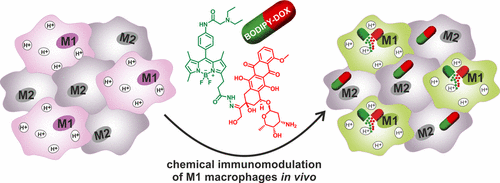Novel Drug Targeting Method Could Improve Immune Disease Therapies

Complete the form below to unlock access to ALL audio articles.
A new technique that targets drugs to specific cells could lead to improved therapies for diseases caused by an overactive immune response. The research was published in the journal ACS Central Science.
The approach could help people affected by conditions such as arthritis and inflammatory bowel diseases, where the body's own immune system mistakenly attacks healthy tissues.
Researchers focused on a group of immune cells called macrophages - some of which help the body heal after injury, while others can promote harmful inflammation.
The team at the University of Edinburgh sought to devise a new therapy to remove harmful macrophages while leaving healing cells unaffected. They coupled a drug compound to a carrier molecule that only becomes active in acidic conditions, such as those found inside harmful macrophages.
A fluorescent tag attached to the molecules enabled the team to track the cells affected by the drug. Lab tests on human macrophages showed the treatment preferentially affected inflammatory macrophages and did not affect healing cells.
Researchers have developed the first prodrug–fluorophore conjugates able to discriminate closely related subpopulations of macrophages (i.e., proinflammatory M1 vs anti-inflammatory M2 macrophages), and employed them to deplete M1 macrophages in vivo without affecting other cell populations. Credit: Fernandez, A., et al. ACS Cent Sci. 2017. doi:10.1021/acscentsci.7b00262
Studies with zebrafish, which share features of their immune system with people, found the treatment helped to improve the recovery of tissues after injury.
The team hopes their approach could lead to more effective therapies, with fewer side effects, for the treatment of immune-related diseases.
This article has been republished from materials provided by the University of Edinburgh. Note: material may have been edited for length and content. For further information, please contact the cited source.
Reference
Fernandez, A., Vermeren, M., Humphries, D., Subiros-Funosas, R., Barth, N., Campana, L., . . . Vendrell, M. (2017). Chemical Modulation of in Vivo Macrophage Function with Subpopulation-Specific Fluorescent Prodrug Conjugates. ACS Central Science. doi:10.1021/acscentsci.7b00262

